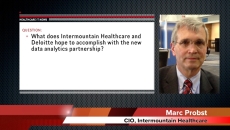Meaningful Use
Marc Probst, CIO of Intermountain Healthcare in Salt Lake City, Utah, discusses a partnership with Deloitte designed to provide clinical data insights to other organizations in the medical community.
The HITECH Act has had its desired effect so far, according to the latest annual report from the Robert Wood Johnson Foundation, which finds heartening adoption levels of health IT across the board, from small physician practices to academic medical centers, over the past three years.
Healthcare, which has always been based on the doctor-patient interaction, is nearing the end of Stage 1 meaningful use, and as the industry increases its reliance on electronic health records, it faces a new challenge. That conundrum, says Nick van Terheyden, MD, and CMIO at Nuance Communications, is how to reconcile the need for standardized structured data capture with the importance of narrative in patient-doctor interactions.
Hill Physicians Medical Group CEO Darryl Cardoza credits the group's successful ACO arrangements, improved efficiencies and the health information technology that supports it all for not only improving patient care, but also lowering costs. And, he's bullish on alignment.
SNOMED was so important to healthcare's switch from ICD-9 to ICD-10 medical coding, ONC Chief Farzad Mostashari, MD says, that he was willing to support the one-year delay to achieve the necessary crosswalks. This system of nomenclature can lay the groundwork and foundation for much better, more granular clinical documentation, he said.
Farzad Mostashari, MD, the national coordinator for healthcare IT, asserted today there would be no extension of the deadline for switching from the ICD-9 medical coding system to ICD-10. The deadline for conversion would remain Oct. 1, 2014, Mostashari said in a keynote delivered this morning at the HIMSS Media ICD-10 Forum in National Harbor, Md.
There has been some buzz lately about how interoperability is a non-issue. I beg to differ. With increasing pressure from federal initiatives like Meaningful Use Stage 2, there is growing need for information exchange across the industry.
More than a third of physician practices plan to purchase, replace or upgrade ambulatory EHR systems, according to HIMSS Analytics' newest Ambulatory Electronic Health Record & Practice Management Study. Meanwhile, nearly half of physician groups say they'll join an HIE.
If you were a healthcare provider and all you did was read press releases, you'd be tempted to think that transitioning to a new EHR involved little more than opening the package and plugging in the contents. Naturally, things are a little more complicated than that.
"Stage 1 is tough but not too tough. Stages 2 and 3 are darn tough," says Laura Kreofsky, principal advisor at Naperville, Ill.-based Impact Advisors. By making Stage 1 so much easier than Stage 2, in some ways, CMS has set a false sense of security for providers.
